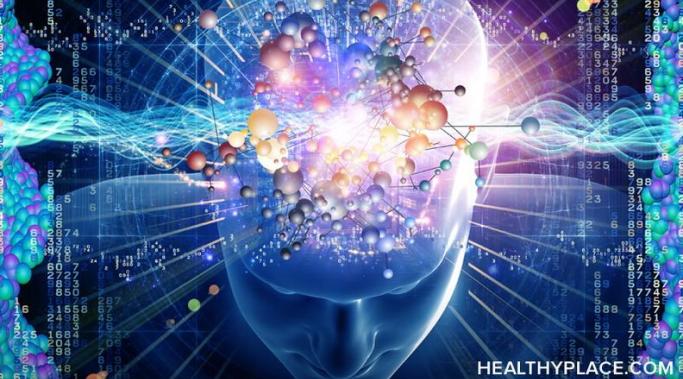A little while back I went through an amazing phase of remission. I started a new medication and it worked like magic in a very short period of time. In short, it was a miracle.
At the beginning, I kept the miracle to myself. Others noticed I had changed but no one said anything and neither did I.
But eventually, a few weeks passed and I just had to tell people how great I felt. I thought I was "safe." I thought the remission would be around for a while. I thought I would be able to announce the good news and then not disappoint people when the treatment stopped working.
I, of course, was wrong.
As fast as the remission came, it left. And I couldn't get it back. It felt like I was being punished about being happy about, well, being happy.
Coping
Recently, someone who was new to the world of bipolar disorder asked me if there was a cure for bipolar disorder or if he had to live like this forever. I had to, of course, tell him there is no cure. I felt like I was telling him his dog was about to die. I felt like knowing this, he might give up.
Recently a doctor stopped by my blog and asked about types of thoughts people with bipolar disorder have. Specifically, he was asking about "crowded" thoughts. Crowded thoughts are likened to "too many people jammed into this office." Crowded thoughts constitute the experience of having too many thoughts at one time.
So it got me to thinking, what are the types of thoughts and what types of thoughts are typical for bipolar disorder.
If you have bipolar disorder or another mental illness it's easy to find yourself in a pit of self-hatred. If the depression doesn't get you there, regret over what you've done when you're manic might. Self-hatred is just all too common for those of us with mental health issues.
And self-hatred produces all kinds of effects - like ignoring self-care. You might find yourself not eating, not showering, not exercising, not being kind to yourself or constantly hearing a voice of hatred in your head. And the trouble with all these things is that not only are they "not good for you" they make you feel worse both in the short and the long term.
Making good self-care choices is a way of fighting back.
If you have bipolar disorder, self-care is so important because it's easy to find yourself in a pit of self-hatred. If the depression doesn't get you there, regret over what you've done when you're manic might. Self-hatred is just all too common for those of us with mental health issues.
And self-hatred produces all kinds of effects - like ignoring self-care. You might find yourself not eating, not showering, not exercising, not being kind to yourself or constantly hearing a voice of hatred in your head. And the trouble with all these things is that not only are they "not good for you" they make you feel worse both in the short and the long term.
Making good self-care choices is a way of fighting back against bipolar disorder.
Sex is a basic human drive. We want to eat. We want to sleep. And we want to have sex. These are the things that bring us pleasure in life. Almost everything boils down to those three things.
But unfortunately, bipolar disorder and bipolar medication can affect all three. Bipolar disorder and its associated medication can make you eat. Or make you not eat. It can make you sleep. Or it can make you not sleep. And it can affect your sex life the same way.
But for some reason, doctors often take the effect on your sex life least seriously.
I’m an independent contractor. This means I sit in front of a computer screen, working at home, alone and writing all day. While this is the dream for many a writer, I can tell you it gets lonely. It’s tough not having work in an office where there are coworkers to chat with at the water cooler.
And this lack of socializing is particularly salient because I have bipolar disorder. I have a tendency to cocoon anyway, and then you take away the day-to-day interactions with people and I suddenly find that I haven’t talked to a person in real life in a week.
So I have to schedule in a personal life – whether I want to or not.
Last week I wrote about how fighting bipolar disorder is like fighting an invisible enemy. And I suggested that creating an internal visual of an "enemy" was a helpful way of differentiating the sick person from the illness itself.
I think stigma is similar. We can let stigma, or thoughts thereof, get into our heads. We can start to believe the ignorant judgements of others and we can let stigma bring us down.
But we don't have to. We can fight.
And while stigma is often something one feels, sometimes it is something one can see too. Like in print. Like in The Daily Athenaeum piece on depression that I wrote about on Monday.
It was chock-a-block with ideas of stigma. But I chose not to believe it and instead I chose to fight.
One of the problems with mental illness is that it's invisible. As I've heard many times, "You don't look sick."
Well of course I don't. You're not looking at an fMRI.
And because we don't "look" sick, our illness moves into the "not real" category. Bipolar, the unreal illness, the imagined one.
And it's even worse because others will tell you that mental illness doesn't exist. Other's will confirm your worst fears and tell you what the tiny, horrible voice in your head has been saying - you're just imagining you're ill. Really, bipolar disorder doesn't exist at all.
But of course the voice is wrong and so are the ignorant people - bipolar is as real as it painfully, awfully, grippingly gets.
But that doesn't make it visible. And its invisibility makes it all that much harder to fight.
As someone recently said to me, Halloween should be a national holiday. It should be the "wear-something-fun-and-gorge-yourself-on-candy" day. It should be just a national day of fun when we're not supposed to be giving thanks or making love or hiding eggs. I could get behind that.
There are two reasons why Halloween is so fun:
1. You get to dress up and pretend to be someone else
2. You get to eat ridiculous amounts of candy and get a ludicrous sugar high
Well welcome to everyday bipolar disorder.


